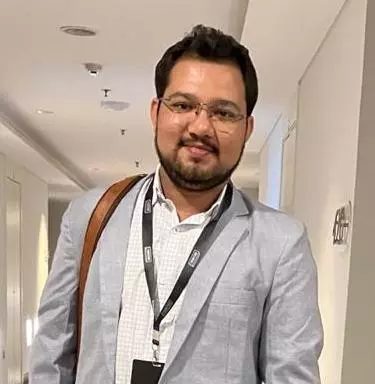Inside Blue Dart’s push for gender inclusion in Indian logistics
In an interview, Sonia Nair, National Head - Customer Service at Blue Dart, shares her journey, the challenges she's faced, and how women are reshaping leadership in Indian logistics.

In an industry long defined by speed, scale and structure, the Indian logistics sector is undergoing a quieter but deeply transformative shift—one that’s reshaping not just how goods move, but who’s leading the movement. At the forefront of this evolution is Sonia Nair, National Head – Customer Service at Blue Dart, whose career defies convention and exemplifies the rising tide of women redefining logistics leadership.
Her entry into the sector wasn’t charted by design but guided by instinct and grit—qualities that have helped her navigate the complexities of a traditionally male-dominated field. Today, she stands as both an executive and an enabler, driving not just operational excellence but systemic change through inclusive policies, mentorship, and representation.
At Blue Dart, Sonia has been instrumental in championing initiatives that go beyond tokenism. From establishing India’s first 100% women-run service centres to building leadership pipelines through the ‘Empowered’ program, she’s helping script a new narrative—one where women aren’t just joining the workforce, but shaping its future.
In this conversation, she speaks with clarity and conviction about what it takes to lead, the support structures that matter, and why the next decade of Indian logistics will be powered as much by empathy and equity as by efficiency and innovation.
1. What inspired your career in logistics, and how have you navigated the challenges of being a woman leader in a traditionally male-dominated industry?
My journey into logistics was quite unplanned. During my management studies, I had a brief stint working on a project with some of the leading players in the courier and logistics space. At that point, I didn’t consider it as a potential career path. However, a few years later, a short article in the newspaper piqued my interest—I applied for a role, got selected, and that decision shaped a deeply fulfilling and successful career.
While logistics has traditionally been male-dominated, I’ve always felt respected and valued for my capabilities. I’ve had the opportunity to work with supportive teams, take on meaningful responsibilities, and grow into leadership roles based on merit and performance. It’s been a rewarding journey, and I’m proud to be part of an industry that’s continually evolving and embracing diversity.
2. What progress have you seen in the representation of women in leadership and operational roles at Blue Dart and in the wider logistics sector?
Blue Dart has shown a strong commitment to enhancing women’s representation across leadership and operational roles. Women are now visible in functions ranging from pilots to front-line couriers. One of our standout initiatives was launching the first 100% women-run service centre, followed by another with a 70:30 women-to-men ratio—significant milestones in an industry traditionally dominated by men.
Our 'Empowered' program focuses on leadership development and aims to increase women in management from 17% to 25% by 2025. These efforts reflect not only our internal goals but also a broader movement across the logistics sector toward greater inclusion and representation.
3. Retention is a common challenge—what do you think causes women to leave the industry, and how can companies better support long-term careers for women in logistics?
Retention often hinges on factors such as work-life balance, limited growth opportunities, and workplace culture. The logistics industry is perceived as demanding, with physically intensive and time-sensitive roles—often making it difficult for women to balance personal and professional responsibilities, especially if flexible policies are lacking.
Additionally, when women don’t see clear pathways to advancement or lack role models in leadership, their motivation can wane. Thankfully, we’re seeing a shift—management schools are playing a role in preparing the next generation for careers in logistics.
At Blue Dart, we’re addressing these challenges through flexible work arrangements for new mothers, leadership development programs, inclusive workplace policies, and safe infrastructure. These initiatives not only support retention but also unlock the full potential of our diverse workforce.
4. What key initiatives has Blue Dart implemented to create an inclusive and empowering environment for women across all levels?
Blue Dart has taken several impactful steps to create an inclusive environment:
- Women-Run Service Centers: In 2021, we launched our first 100% women-run service center in Navi Mumbai, followed by another with a 70:30 women-to-men ratio. These centers employ women across traditionally male-dominated roles—including delivery and security.
- Leadership Development (‘Empowered’ Program): With a 70% female participation rate, this initiative nurtures leadership through mentorship, training, and skill-building, aiming to boost women in management from 17% to 25% by 2025.
- Flexible Work Arrangements: Particularly for new mothers, we offer flexible working hours to help balance personal and professional life.
- Safety and Sensitisation Measures: We provide gender sensitisation workshops and offer pick-up/drop services for women involved in night operations to ensure their safety.
- Employee Referral Program: Our 'Each One Refer One' policy encourages team members to refer women candidates, strengthening our diversity goals.
5. As a senior leader, how do you manage work-life balance in such a demanding sector, and what role has family or workplace support played in your journey?
Balancing work and life in a fast-paced industry like logistics requires clarity, prioritisation, and a strong support system. Over time, I’ve learned to manage my time effectively, delegate when needed, and focus on what truly matters—both professionally and personally. Setting boundaries has helped ensure that I’m present where I need to be, whether in meetings or with my family.
Family support has been the cornerstone of my journey. Their encouragement and understanding, especially during demanding periods, have helped me stay grounded. Equally important has been the culture at Blue Dart—progressive policies, inclusive leadership, and a genuine emphasis on employee well-being have enabled me—and many others—to grow professionally without compromising on personal values.
6. Looking ahead, what excites you most about the future of logistics in India, and how do you see women shaping the industry's next chapter?
The future of logistics in India is incredibly promising. With rapid advancements in technology, a booming e-commerce sector, and infrastructure growth, we are transitioning into a more agile, tech-driven, and customer-centric space. What excites me most is how these changes create room for innovation, new roles, and inclusive growth.
Women will play a pivotal role in shaping this next chapter. We are already witnessing a growing presence of women in operational, technical, and leadership roles—breaking stereotypes and offering fresh, collaborative approaches to problem-solving. As the industry continues to embrace diversity, women won’t just participate—they will lead, driving meaningful change and progress.

Rajarshi Chatterjee
Rajarshi is an editorial professional with nearly a decade of experience in writing content for print and online publications. He has hosted numerous entrepreneurship events and moderated sessions at various events, including Flower Logistics Africa. He has previously worked with reputable organizations such as YourStory, YouGov, Inc42, and Sportskeeda and has catered to a diverse range of clients, including Google, PhonePe, the Karnataka State Government, and the Rajasthan State Government. In addition to writing, he enjoys watching films, cooking, and exploring offbeat locations in India.


